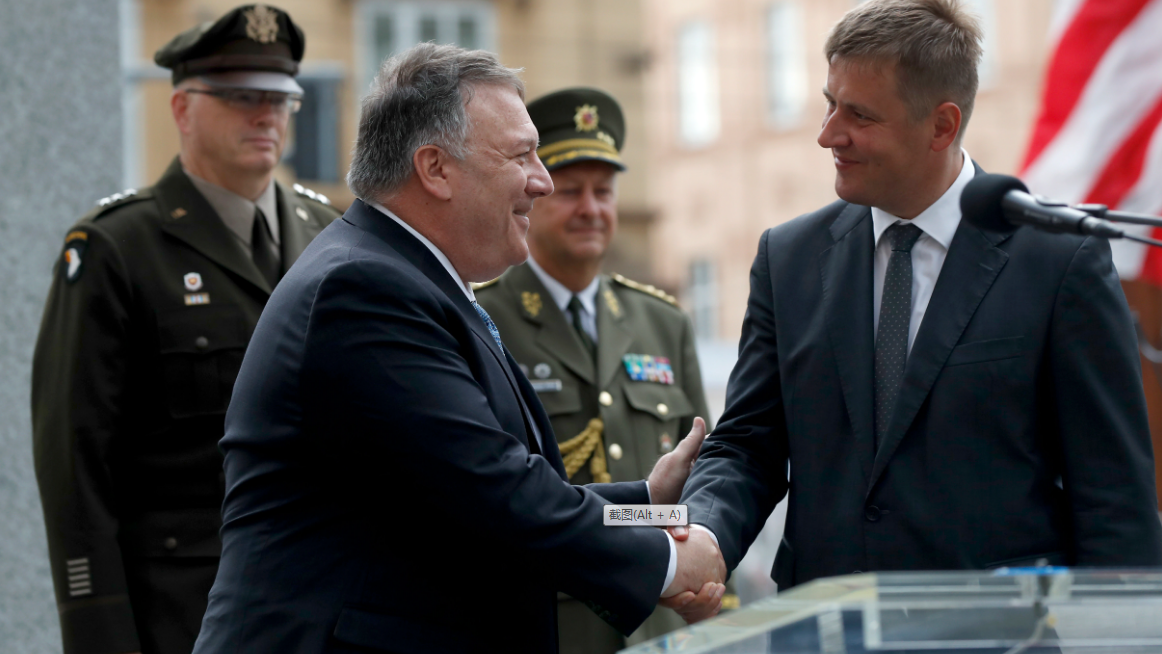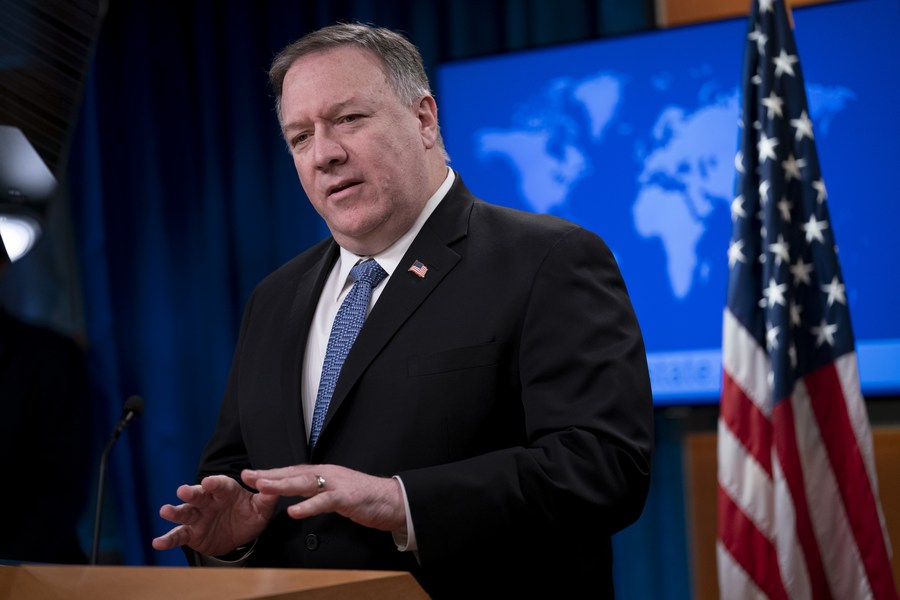
U.S. Secretary of State Mike Pompeo (L) shakes hands with Czech Republic Foreign Minister Tomas Petricek during a ceremony at the General Patton memorial in Pilsen near Prague, Czech Republic, August 11, 2020. /AP
U.S. Secretary of State Mike Pompeo (L) shakes hands with Czech Republic Foreign Minister Tomas Petricek during a ceremony at the General Patton memorial in Pilsen near Prague, Czech Republic, August 11, 2020. /AP
Editor's note: Bradley Blankenship is a Prague-based American journalist, political analyst and freelance reporter. The article reflects the author's opinions, not necessarily the views of CGTN.
U.S. Secretary of State Mike Pompeo, during the first leg of his European trip starting in the Czech Republic, claimed that Russia and China are trying to destroy Western democracies in multiple speeches delivered before Czech officials. In addition, he pounded away at the so-called Three Seas Initiative which envisages connectivity in the region in infrastructure, energy and the digital sphere. While Pompeo's first visit may have looked good in the press, the trip is unlikely to produce the results he wants and shows that European leaders are holding their breath until November.
The secretary's trip to Central Europe in particular was marred in controversy over a controversial order by President Donald Trump to pull nearly 12,000 troops from Germany and redeploy them to other NATO member states. Much of the American media has frowned upon the decision and politicians such as Senator Mitt Romney have categorized the move as "a grave error" and "a gift to Russia." But Pompeo didn't mince words in his hawkish tirades in Prague this week.
"It is worth remembering, even as we celebrate, that because authoritarianism is still alive in Beijing, in Moscow and in Tehran there remains work to do," the secretary said in a brief speech in Pilsen on Tuesday.
These inflammatory remarks were eclipsed by his speech to the Czech Senate on Wednesday in which he described China as the greatest threat to the world. This earned Pompeo praise from right-wing Senate President Milos Vystrcil, who is himself a weirdly fanatic China-hawk, but such remarks have failed to actually hit home with other high constitutional officials. The Czech position has remained clear: as a member state of the European Union, it categorically rejects dividing the world into competing camps in a new Cold War scenario.
But by casting relations with the U.S. or China as a binary, Pompeo is hoping to chip away at the bloc's unified pragmatic position on the U.S. attempt to launch a new Cold War on China. By launching bilateral diplomatic negotiations and interfering in international trade, the secretary hopes to pull the bloc away from friendly trade relations with China, bit by bit. Other than this, there is no serious principle being sought after – certainly not a battle for "democracy" versus "tyranny," as the secretary has repeatedly described his crusade.

Pompeo speaks during a press briefing in Washington, D.C., U.S., March 5, 2020. /Xinhua
Pompeo speaks during a press briefing in Washington, D.C., U.S., March 5, 2020. /Xinhua
One of the core issues the secretary has brought to the Czech Republic for quite some time is the issue of 5G security. In early May, Czech Prime Minister Andrej Babis and Pompeo signed a joint declaration on this issue that seeks cooperation between the two countries in combating "undue foreign influence." While China was not mentioned by name in the joint declaration, no doubt this was a clear attempt by Pompeo at snubbing Huawei in 5G development.
But these attempts to influence trade and government contracts are unlikely to move forward. On Tuesday, Czech Foreign Minister Tomas Petricek, who met with Pompeo in Pilsen that same day, said that the Czech Republic has no interest in signing another memorandum with the U.S. regarding a nuclear energy contract. According to the minister, such a memorandum would complicate the contract's completion with the European Commission.
Pompeo's reasoning for pushing a memorandum that would likely hand the government contract for a new nuclear energy unit in Dukovany over to U.S.-based Westinghouse Electric Company was that Russian (or Chinese) investment in the project would be a threat to Czech national security. No one believed this at the time the initial contract was signed by the government and CEZ, a major Czech energy company, and certainly no one believes it now.
"As the investor, CEZ will be selecting the future supplier in an open competition. Such a memorandum with one of the potential suppliers could send a bad signal to the European Commission and the market," the Czech News Agency quoted Industry and Trade Minister Karel Havlicek as saying.
While the Czech Republic and the United States have exceptional relations, it is unlikely that, with the very real possibility of a Trump defeat in November, the European country is likely to follow America into a new Cold War and simply bend the knee. Pompeo and Czech officials had their photo-ops, but it's clear that the adults in the room ultimately see the writing on the wall. A likely administration under former Vice President Joe Biden would totally reset transatlantic relations, so why waste time with a rabid diplomat on his way out?
Trump diplomats see Central Europe as a chink in the EU's armor. This is, however, wishful thinking because Europe has shown quite consistently that it is pursuing a united yet independent foreign policy trajectory. European leaders are supporting multilateral institutions, which is something even Pompeo was asked about during the Czech Senate discussion, while Washington is not. The cleavages between Europe and America are only growing by the day as Trump sits in the White House.
Expect soundbites and photos from Pompeo's European trip, maybe even a memorandum or declaration with one of the country's on his itinerary, but don't expect bloc-wide results in diplomacy until at least next year.
(If you want to contribute and have specific expertise, please contact us at opinions@cgtn.com.)